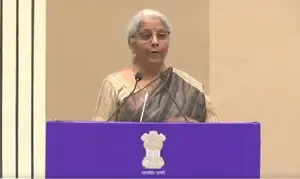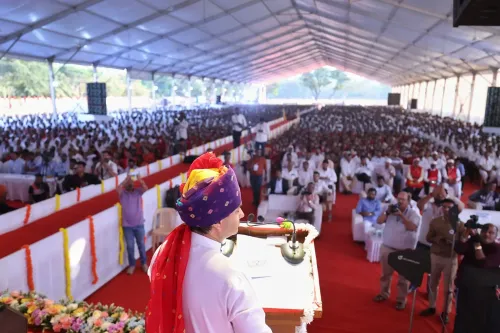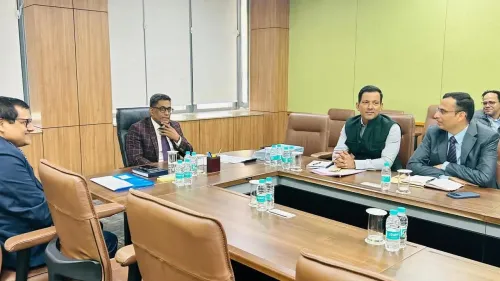Vishwas Bill 2.0 Aims to Decriminalize Over 100 Provisions, Simplifying Business Processes: FM Sitharaman

Synopsis
Key Takeaways
- Vishwas Bill 2.0 will decriminalize over 100 legal provisions.
- Focus on enhancing capital expenditure for economic growth.
- Government has removed over 42,000 compliances since 2014.
- Implementation of PM Internship scheme creating over 1.25 lakh internships.
- Stakeholder collaboration for effective policy execution.
New Delhi, March 5 (NationPress) Finance Minister Nirmala Sitharaman stated on Wednesday that the government is dedicated to fostering global economic partnerships, utilizing technology to bolster traditional sectors, and significantly improving India's export capabilities.
During a post-budget webinar themed ‘Regulatory, Investment, And Ease Of Doing Business (EODB) Reforms’, she announced the introduction of the general Vishwas Bill 2.0 aimed at decriminalizing over 100 provisions across various laws. This initiative will further streamline processes for businesses, the minister noted.
The Finance Minister underscored the government's commitment to the timely execution of all budget declarations for the fiscal year 2025-26.
Focusing on capital expenditure, Nirmala Sitharaman stated that the framework for reforms is supported by the government’s steadfast emphasis on capital spending as a catalyst for economic growth. For the fiscal year 2025-26, total effective capital expenditure is projected at 15.48 lakh crores, which represents 4.3 percent of the GDP, with 11.21 lakh crores designated as core capital expenditure by the Centre, accounting for 3.1 percent of the GDP. This historic investment in infrastructure development is already generating jobs, strengthening industries, and laying the groundwork for private sector involvement in India’s growth narrative.
The Finance Minister also pointed out that budget initiatives for 2024-25, such as the increase in the MUDRA loan limit from Rs 10 lakh to Rs 20 lakh and the new MSME Credit assessment model, have been effectively implemented. A total of 11 Public Sector Banks have extended this to current customers, while seven banks have made it available to new customers as well. Furthermore, 21 new SIDBI branches have been established in MSME clusters during 2024-25 as per the budget announcement.
The Ministry of Corporate Affairs has launched a pilot project for the PM Internship scheme, which was introduced in the 2024-25 budget, creating over 1.25 lakh internship opportunities in leading companies, with more than 6 lakh applicants. The government remains committed to minimizing regulatory burdens and enhancing trust-based governance to facilitate the ease of doing business.
The decriminalization of business-related laws mitigates legal risks, allowing industries to function with increased confidence, she added.
The Finance Minister mentioned that a robust manufacturing sector, devoid of unnecessary regulatory hurdles, will attract both domestic and foreign investments, thereby propelling economic growth and positioning India as a reliable global player. Since 2014, the government has eliminated over 42,000 compliances, and over 3,700 legal provisions have been decriminalized. The Jan Vishwas Act 2023 saw the decriminalization of more than 180 legal provisions.
During the thematic session of the post-budget webinar, M. Nagaraju, Secretary of the Department of Financial Services, reported that under the MUDRA Scheme, loans amounting to Rs 33 lakh crore have been sanctioned. Under the Stand-Up India initiative, Rs 59,000 crore has been sanctioned to approximately 2.62 lakh accounts. Additionally, the PM SVANidhi scheme has sanctioned Rs 14,000 crore distributed across 99 lakh accounts.
The Finance Minister noted that Wednesday’s webinar united stakeholders from various ministries, including Finance, Industry Policy, Internal Trade, Corporate Affairs regulators, state governments, public sector banks, insurance companies, SIDBI, NABARD, and industry associations to ensure effective policy implementation.
She acknowledged the significant contributions received during the discussion and stated they would be duly considered. These insights will aid in aligning strategies, addressing potential implementation hurdles, and ensuring that budgetary announcements are efficiently transformed into actionable results, FM Sitharaman concluded.










